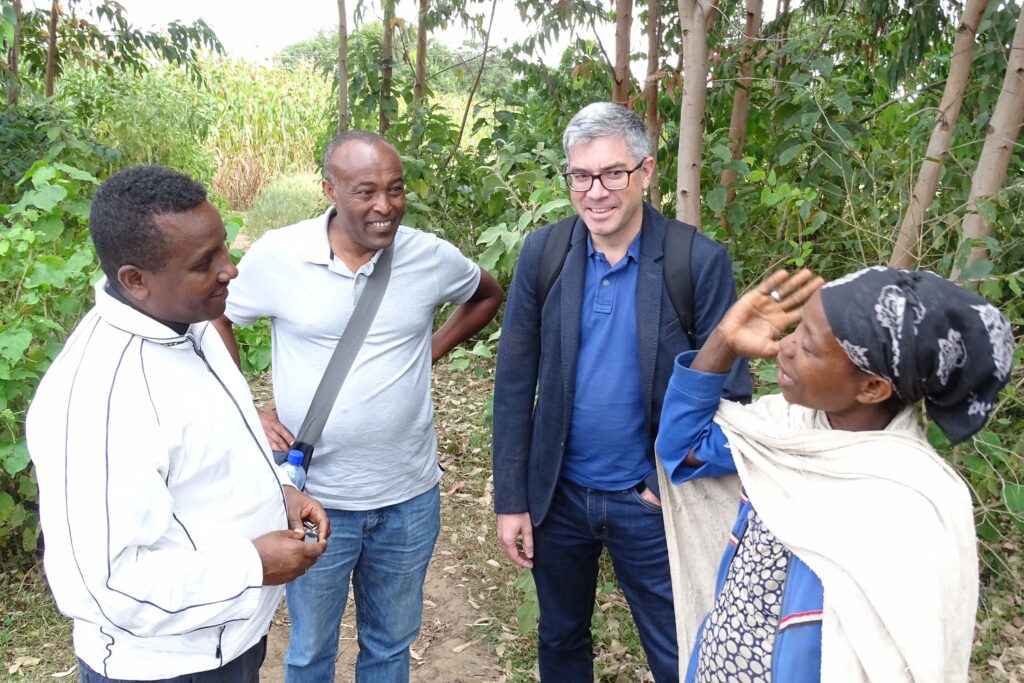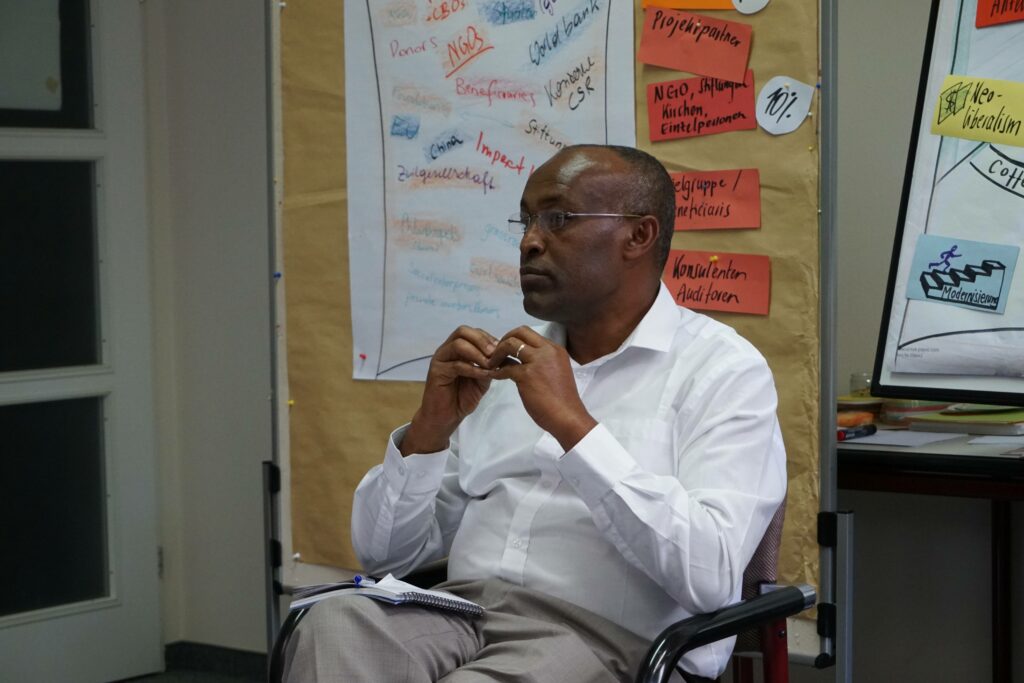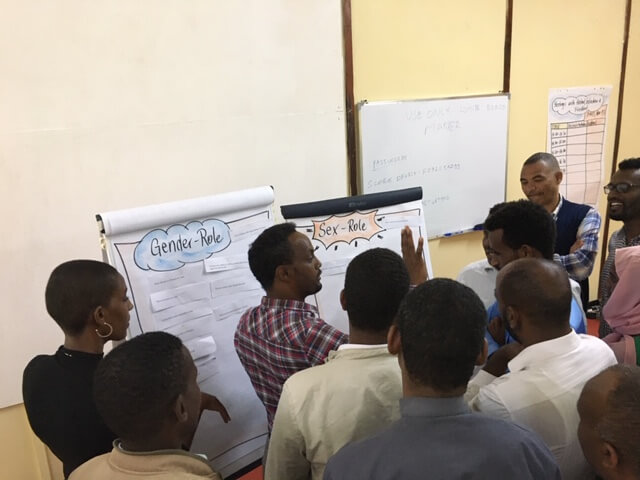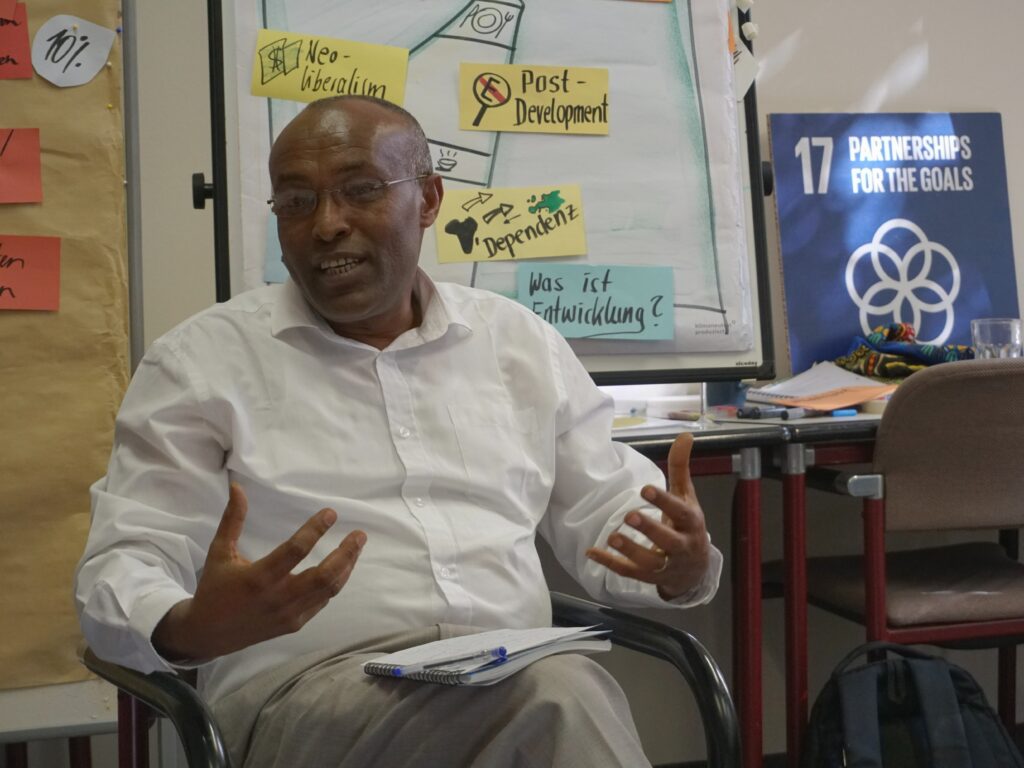Make Your Experiences Count. They Can Change the World.
LET’S BRING ALL OF OUR KNOWLEDGE AND EXPERIENCES TOGETHER.
TOGETHER WE KNOW MORE. TOGETHER WE ACHIEVE MORE. TOGETHER WE DO BETTER.
LET’S BRING ALL OF OUR KNOWLEDGE AND EXPERIENCES TOGETHER.
TOGETHER WE KNOW MORE. TOGETHER WE ACHIEVE MORE. TOGETHER WE DO BETTER.
Published: June 20, 2023
Contributing to SDG 5 has always been an important aim in our work at HORIZONT30000 (“Achieving gender equality and empowering all women and girls”). With our new framework programme this task has taken a leading role again. After all, there is a reason why the new programme is called “Gender Equality 4 Sustainable Development”.
We are taking the opportunity to look at achievements made in Ethiopia, as we believe that other regions and countries can learn from it as well. In the last couple of years our partners in Ethiopia have invested a lot in advancing gender equality and gender mainstreaming on institutional and programme level. At the centre is a long-term gender mentoring process, which has been running since 2021 with the support of DKA Austria (Dreikönigsaktion).
We talked with Getachew Aberra, programme director in Ethiopia, to learn more about how a gender mentoring process should be organised, how it is having an impact on multiple levels, and how our partners are addressing gender gaps within their own organisations.

Can you tell us a little bit about the gender related activates you have been coordinating in Ethiopia, in particular the whole gender mentoring process?
Well, directly connected to the KNOW-HOW3000 programme are the workshops we have done with our partner organisations on the “Do-No-Harm”-approach, as well as the documentary video about FGM (Female Genital Mutilation).
But the gender mentoring process is also indirectly connected, as it consists of capacity building and skill development for the partners. We did the whole process in agreement with HORIZONT3000, but it was the DKA Austria (Dreikönigsaktion) who financed the gender mentoring by hiring an expert, financing the different mentoring activities and the visits of the expert to each of the partner organisation in order to conduct on-site trainings.
Initially, assessing each partner based on their needs was very important, because not all of the partner organisations are at the same level in terms of skills, in terms of knowledge on gender topics. Another important part was then to establish a gender equality and social inclusion team at each of the project partners. These teams practically consist of staff of the partner organisations. So, they were doing it themselves, you know. The role of the expert was really to provide them technical guidance and trainings to build their capacity and their skills.
So now they can work on conducting their organisational, programme and project gender audit and on gender analysis in their project and programme operational areas. They have been trained to do that. In this process many tools were developed and many training materials produced, for example on gender mainstreaming to show how it works and how it can be implemented.
All this has been done in the past two and a half years really. We started the gender mentoring process in January 2021 – it is quite a long-term process.
That has been quite a journey. What next steps do you have planned?
Gender Policies, Action Plans, and Learning Brief
As a first step the objective was to build the capacities and skills and knowledge of the project partners in gender concepts and gender mainstreaming. In the end, each and every partner organisation should have a good gender policy in place. Those who already have one, revise it and develop guidelines, and those who do not have any yet are developing a completely new gender policy. Of course, they this also includes a strategy for gender policy implementation, an implementation action plan.
These processes are now almost through. In June we will organise like almost a sort of a final concluding workshop where, officially, the gender policy of each of the organisations, including the action plan strategies, and guidelines, will be approved by the leaderships. Then we all celebrate the success of the process! So, by June 30th 2023, I think it will come to an end.
After that, the expert and myself will assess the whole process and develop like a “learning brief” of maybe 3 to 5 pages. This will then be shared with HORIZONT3000, also for the purpose of knowledge management and sharing of experience. Depending on the fund balance available, we are also planning to commission professionals to produce a 15 to 20 minutes video documentary of that process.

Space for real implementation
Now we are almost at the final stage, but of course, Gender Mainstreaming is a continuous process. It is not like saying: “OK, we have financed the process, we coordinated it, and now each and every partner has its policy, strategy, and action plan – and now it is good.” That is not possible, it really takes time until the partner organisations and their staff make Gender Mainstreaming part of their organisational culture. This takes quite something.
So, what we are planning now is to give the partners the opportunity to implement their action plans that have been developed and approved, and we will see how they are progressing. By the end of this year, we’ll be assessing again, maybe with the help of an external expert, if needed. In principle, we have agreed with DKA to continue the technical and monitoring support of the expert. This also includes to guide them through the implementation process of the gender policy at organisation level, as well as project and programme level. I’ll be coordinating and facilitating this continuous technical support and monitoring. This is the plan.
So, we will give the partners a chance, a sort of free space to implement their policy on their own at least for six months, and we will see if they manage or not. If not, the intervention plan is already in place, so I think we are on the right track. Now for the time being, we’ll conclude the whole two and a half years process first.
What would you say were the main challenges during the process? How did the partner organisations take it?
Well, international donor organisations are already demanding gender policies, so the partners already felt the need to have such a policy, you know, for their own advantage. So, there was no resistance in this regard.
Of course, at the same time not all of the organisation leadership responded the same to some of the request, because they have also their own competing priorities. Some have to focus on the day-to-day business, there is no time for everything. This had also some implications on the process when it comes to meeting the time frame that was agreed upon. And for example, whenever we organise a training or workshop for all the partners, the time frame might be OK for them, or it might not be OK for them again – you have to discuss and negotiate again and again. So this was a challenge sometimes.
Another challenge we have faced were staff turnovers at some of the organisations. Some of those colleagues who left were the ones who were really trained. So we had to start training new people again.
Of course, COVID was also another challenge: For example, we had to pay double for renting bigger spaces to keep people at least one metre apart. But we have managed somehow to overcome and to mitigate the situation.

This process you have been working on for the last couple of years is just starting with other partner organisations in different countries. What would you recommend other Regional and Country Offices?
Assessing Capacities
First, before diving into the whole process, any regional office or any country office needs to assess the capacities of the organisations to know where they are in terms of the knowledge, skills, and the concept of Gender and Gender Mainstreaming in general. So, once you identify that gap, then you know exactly who is on which level, and you know what kind of mentoring support each of the organisations may need.
Based on this you can develop your mentoring process proposal as part of the capacity development for the partners. I think it will only be after this assessment that proposals will be developed, and then reviewed and then approved, – and then you can really launch the long-term process. Well, you know, two years is a very long time! It is not as simple as just sitting here on the desk and develop a proposal or copy and paste it from somewhere else and then say “OK, now we can launch the process”. This won’t be possible! It’s very difficult as it should be context-based as much as possible.
Know your national gender policy
I don’t know how the policy on gender differs at the national level from country to country, but this would also be one of the important aspects to look into, because support from the national policy is very crucial for the sustainability of any programme component. If the national policy does not support the policy, you are introducing there, the probability of failing is very, very high. So, for the sustainability and for the success of the policy implementation, you need to cheque if that policy really supports your idea.
So, these are the important aspects. In any case, assessment is a must: to know the capacities, knowledge and skills of the partners.
How long did this pre-assessment take you?
It took us close to one year, around 10 months. And then you also need to have a very competent and committed gender expert. Without that, it will be difficult. In fact, Martha Nemera, the gender expert we are working with, is one of the most recognised in the country. So, it wouldn’t hurt to have someone like that.

One last question, because I noticed that there are mostly men working in the partner organisations – is that true?
Yes, but that is that is slowly changing now. For example, in many of our partner organisations new employments are already targeting women directly to come closer to the 50/50 male/female-ratio.
On the other hand, around 80-90% of the partner organisation’s project employees are female but you may hardly find women at leadership positions.
Yes, it is like that in many places.
Right, but now the process has started here. You cannot push men, but the moment they resign and leave the organisation, we are trying to replace them by female staff.
Well on one level it could also be an opportunity. I mean, if a lot of men participate in trainings, like they did in the “Do-No-Harm” workshops, they are engaging more men at key positions for gender equality.
They do, they do. Those who are engaging in these workshops are mainly men. And their understanding and their awareness is growing and developing. The gradual change of attitude is already going on and we see it here and there, particularly around employment.
So, I think at the project “beneficiary” level there is no problem, but at staff employee level we see a huge gender disparity and gender gap. Although the process is slow in this regard, we are on the right track.
Thank you for the interview!